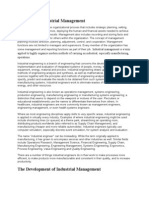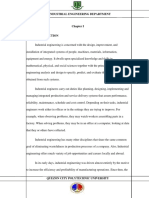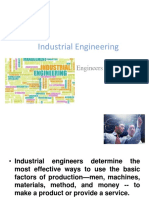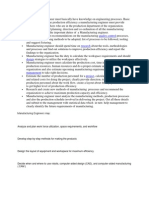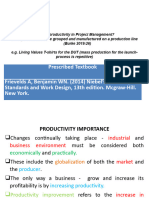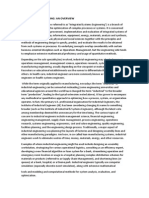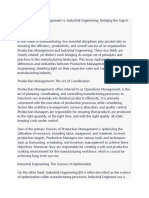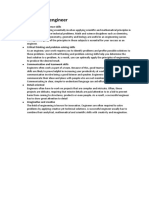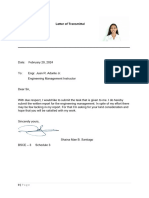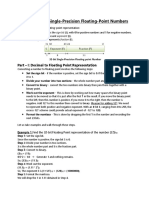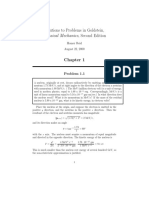English
English
Uploaded by
Anna MykaCopyright:
Available Formats
English
English
Uploaded by
Anna MykaCopyright
Available Formats
Share this document
Did you find this document useful?
Is this content inappropriate?
Copyright:
Available Formats
English
English
Uploaded by
Anna MykaCopyright:
Available Formats
Submitted by: Bagarinao, Ma. Cristina R. De los Reyes, Paulen Angel E. Naceno, Diane Louise P.
Nagutom, Ana Myka Ela M.
Submitted to: Professor Maria Cora Larobis
CAREER PATH OF AN INDUSTRIAL ENGINEER I. Introduction Industrial Engineering is a branch of engineering which is concerned in the interaction of people, machines and energies. This course is often called as a broad type of engineering, unlike other engineering disciplines which only focuses in a very specific area, but this course is required to solve large and complicated real world problems. Industrial Engineers are important, especially in the improvement and productivity of a company. They are employed to improve efficiency, quality and safety. Many people often misled the word industrial engineer. They always say that Industrial Engineers only work on a manufacturing, but theyre wrong. Industrial Engineers can also be employed in many types of industry-- in variety of business like in service industry. Their work is to eliminate waste of time, money, energy and other resources. Industrial Engineering in the Philippines doesnt have a board examination. They can only be called certified Industrial Engineers if they will take a certification from the Philippine Institute of Industrial Engineering (commonly known as the PIIE).The certification can only be gotten if an Industrial Engineer has a three- year experience in the field. In the industry, there are requirements Industrial Engineers must comply with. The qualification of an Industrial Engineering to get a job is having a broad mechanical knowledge especially in industrial production and technology. They must have a sharp knowledge in designing, and computer. And also must be good in speaking English. Knowledge in Mathematics is necessary for Industrial Engineers to get a job, since their work involves arithmetic, calculus, algebra, geometry and statistics. These Mathematics
discipline are being studied by Industrial Engineers as part of their curriculum. So, Industrial Engineer graduates easily get a job. Industrial engineers were trained as productivity and quality improvement specialists. They are usually employed by companies because of adopting such philosophies. They work with the goal of ensuring that goods and services are being produced and provided with the right quality, in the right time and at the right cost. When a problem comes to a company, Industrial Engineers adopt a holistic and integrated approach to problem-solving that requires scientific analytical methods and creativity. Industrial Engineers not just improve productivity and quality but also save time and money. They see and focus onto what will make a system perform efficiently, safely and effectively to produce the highest quality. There are different fields where Industrial Engineers can work. It can be in a manufacturing industry or service industry. In these fields, Industrial Engineers form a necessary connection between management and engineering where scientific methods are essentially used in making managerial decisions. In a manufacturing industry, Industrial Engineers were the one who is ensuring that the equipments, manpower and other resources are in unity in manner to maintain efficient operation and ensure a continuous improvement. While in a service industry, Industrial Engineers may work in finance, information systems and hospitals.
II. Qualifications of being an Industrial Engineer A. Broad imagination An Industrial engineer needs to have curiosity, broad imagination, good communication and social skills, ability to visualize the effects of change and an interest in people and systems. If youre not having these kinds of characteristics, then it can be said that you are not yet qualified to be an Industrial Engineer. The major and common tasks assigned to an Industrial Engineer are planning how systems will work, measuring work performance, establishing work standards and specifications, establishing and managing quality standards, analyzing project benefits and costs, estimation of production cost, creation of effective product design, development of production standards and completion of production within the given time frame. Engineers decide and monitor the quality control objectives and resolve any kind of problem that occurs during the production process. The main focus is always on the efficient production and cost minimization. An Industrial Engineer also keeps an update of the project status, purchases, manufacturing and production processes. Summarizing the design, layout and draft of the equipments and materials are also tasks of an Industrial Engineer. B. Bachelors degree Having a bachelors degree is necessary and an advantage to become a full-fledged and certified Industrial Engineer. An engineering degree with the knowledge of industrial production and technology is the most important qualification required for a job of an industrial engineer. Recommended coursework includes statistics, computer skills,
ergonomics, management science, quality control, sociology, psychology, organizational behavior, economics, finance, labor relations, and mathematics. Those who plan to specialize in manufacturing areas find it useful to study shipping, billing, and automated systems, along with computer science. A brilliant design sense, proficiency on English language and computer knowledge are the other requirements to do the work of an industrial engineer. C. Strong background of Mathematics A strong background of Mathematics is a necessity since the work involves the application of arithmetic, calculus, algebra, geometry and statistics. The job profile also demands a command on management and administration principles which are the basic tools for resource allocation, production and strategic planning, and; work coordination and authorization. D. Logical and critical thinker As a skill requirement, you have to have the ability to think logically and critically that will help industrial engineers to weigh the various available options and take the best decision in favor of efficient production. They should also possess the active listening and fast reading skills to take the desired steps in flick of seconds. Quick decision making and excellent time management skills make the person doing industrial engineering jobs, quite resourceful. Looking to the present industrial progress, the career opportunities in industrial engineering are quite promising. Industrial engineer jobs demand multitasking, but the job can be made easy by striking the right balance of technical expertise and managerial skills.
III. Concerns of Industrial Engineers in their works
There are different types of works that an Industrial Engineer may get involved. In the company that they are working with, they are given a task that they should have focused and concerned. These kinds of concerns are analyzing statistical data and product specifications to determine standards and establish quality and reliability objectives of finished product; developing manufacturing methods, labor utilization standards, and cost analysis systems to promote efficient staff and facility utilization; recommending methods for improving utilization of personnel, material, and utilities; planning and establishing sequence of operations to fabricate and assemble parts or products and to promote efficient utilization; applying statistical methods and perform mathematical calculations to determine manufacturing processes, staff requirements, and production standards; coordinating quality control objectives and activities to resolve production problems, maximize product reliability and minimize cost; discussing with vendors, staff, and management personnel regarding purchases, procedures, product specifications, manufacturing capabilities, and project status; drafting and designing layout of equipment, materials, and workspace to illustrate maximum efficiency using drafting tools and computer; reviewing production schedules, engineering specifications, orders, and related information to obtain knowledge of manufacturing methods, procedures, and activities; communicating with management and user personnel to develop production and design standards; estimating production cost and effect of product design changes for management review, action, and control; formulating sampling procedures and designs and develop
forms and instructions for recording, evaluating, and reporting quality and reliability data; recording or oversee recording of information to ensure currency of engineering drawings and documentation of production problems; studying operations sequence, material flow, functional statements, organization charts, and project information to determine worker functions and responsibilities; directing workers engaged in product measurement, inspection, and testing activities to ensure quality control and reliability; implementing methods and procedures for disposition of discrepant material and defective or damaged parts, and assess cost and responsibility; evaluating precision and accuracy of production and testing equipment and engineering drawings to formulate corrective action plan; completing production reports, purchase orders, and material, tool, and equipment lists; scheduling deliveries based on production forecasts, material substitutions, storage and handling facilities, and maintenance requirements; and regulating and altering workflow schedules according to established manufacturing sequences and lead times to expedite production operations.
IV. Conclusion
Being an Industrial Engineer is not an easy task. Before having this title, there are different qualifications that you must have. These qualifications require a lot of perseverance, hard work and patience. Industrial Engineers are flexible engineers because they are not just focused in one specific task. People used to think that Industrial Engineers work is meant to be only in factories and other manufacturing plants to supervise workers. Industrial Engineers are such great assets in the company because they can work in different areas of the company. One best thing about being an Industrial Engineer is that they are very good problem solvers. Industrial Engineer can be someone that people think may not be.
WORKS CITED
Industrial Engineering Major Guide for 2010-2011. utk.edu.Web.March 17, 2012. Industrial Engineering. ncsu.edu.Web.March 17, 2012. Industrial Engineers - What They Do. studentscholarships.org. Web. March 24, 2012. Industrial/Manufacturing Engineering. gostudy.mobi.Web. March 26, 2012. How to become an Industrial Engineer. mypursuit.com.Web. March 26, 2012. Industrial Engineering. resourceplan.co.ke.Web. March 26, 2012. What do Industrial Engineers do? industrialengineering.dal.ca.Web.March 26, 2012. Plant Industrial Engineer. collegefortn.org. Web. March 26, 2012. 2141 - Industrial and Manufacturing Engineers Analytical text. servicecanada.gc.ca.Web. March 27, 2012.
You might also like
- Mathematics For Engineers I Basic CalculusDocument403 pagesMathematics For Engineers I Basic Calculusbiswa16100% (9)
- SBI PO Data Analysis and Interpretation - Preparation StrategyDocument8 pagesSBI PO Data Analysis and Interpretation - Preparation StrategyPapan SarkarNo ratings yet
- 01 - Introduction To Industrial Eng - r1Document23 pages01 - Introduction To Industrial Eng - r1Eddy FazwanNo ratings yet
- Concepts of Industrial ManagementDocument9 pagesConcepts of Industrial ManagementSandeep Shrivastava50% (2)
- OD Unit 5Document16 pagesOD Unit 5dhivyaNo ratings yet
- Mrjacksonmaths Foundation Calc Paper A AnswersDocument6 pagesMrjacksonmaths Foundation Calc Paper A AnswersRussell JacksonNo ratings yet
- The Role of An Industrial EngineerDocument2 pagesThe Role of An Industrial EngineerSuhailShaikhNo ratings yet
- Role of Manufacturing or Industrial EngineerDocument5 pagesRole of Manufacturing or Industrial EngineerHarish PadmanabanNo ratings yet
- Industrial Engineering DepartmentDocument3 pagesIndustrial Engineering DepartmentCrisha SampagaNo ratings yet
- Thesis Chapter 1Document7 pagesThesis Chapter 1Youie MenesesNo ratings yet
- Industrial Engineering PDFDocument73 pagesIndustrial Engineering PDFIrfa Tzu QirraNo ratings yet
- What Is Manufacturing Engineering?Document50 pagesWhat Is Manufacturing Engineering?mariappanNo ratings yet
- Industrial Engineering: What Industrial Engineers Do?Document28 pagesIndustrial Engineering: What Industrial Engineers Do?Ayaan ChakravarthiNo ratings yet
- Industrial EngineerDocument3 pagesIndustrial EngineerpriyasubhaNo ratings yet
- Course Eeci 5291Document47 pagesCourse Eeci 5291Brian ObumbaNo ratings yet
- Industrial Engineering: Dr. Usama Jasim NaeemDocument10 pagesIndustrial Engineering: Dr. Usama Jasim NaeemAli Hassan AHNo ratings yet
- Revista de Ingeniería Industrial en InglesDocument6 pagesRevista de Ingeniería Industrial en InglesRodiannys Saray Quijada RiveraNo ratings yet
- Manufacturing EngineerDocument14 pagesManufacturing EngineerZarana BhattNo ratings yet
- 03 FD Industrial Engineering & Designing ProductsDocument58 pages03 FD Industrial Engineering & Designing ProductsTan Tok HoiNo ratings yet
- Industrial Engineering English Reading Material Sec 0405Document9 pagesIndustrial Engineering English Reading Material Sec 0405GerardoHerreraNo ratings yet
- Job OpportunitiesDocument4 pagesJob OpportunitiesdasfagagNo ratings yet
- Industrial and ProductionDocument4 pagesIndustrial and ProductionnetsimastudioNo ratings yet
- Subject: IE and PM Assignment 1Document66 pagesSubject: IE and PM Assignment 1Rakesh ShNo ratings yet
- iNDUSTRIAL ENGINEERING UINTRODUCTIOMDocument49 pagesiNDUSTRIAL ENGINEERING UINTRODUCTIOMe tutorNo ratings yet
- Lecture 1 - Chapter 1 - Productivity and Quality of Life ....Document38 pagesLecture 1 - Chapter 1 - Productivity and Quality of Life ....Mahlatse100% (1)
- 323 Chapter 1 Methods, Standards, and Work DesignDocument18 pages323 Chapter 1 Methods, Standards, and Work DesignCristi EteganNo ratings yet
- Regina Problem DomainDocument62 pagesRegina Problem DomainRmoodiRNo ratings yet
- Industrial EnggDocument75 pagesIndustrial EnggAlthaf VANo ratings yet
- Plant HeadDocument25 pagesPlant Headpankajmpawar1986No ratings yet
- Industrial and System EngineeringDocument213 pagesIndustrial and System EngineeringAjaikrishna100% (1)
- IEM Content and IntroDocument15 pagesIEM Content and IntroBhoomika R ReddyNo ratings yet
- Industrial Engineering at A GlanceDocument12 pagesIndustrial Engineering at A Glancemuharremaksoy619No ratings yet
- Industrial Engineering: An OverviewDocument3 pagesIndustrial Engineering: An OverviewniltonanyosarivasNo ratings yet
- A Mudanca SocialDocument13 pagesA Mudanca SocialAna Maria Holoca José AnethNo ratings yet
- Production Management Set1 and Set2Document40 pagesProduction Management Set1 and Set2Shiva PrakashNo ratings yet
- Industrial Engineering Division 2Document3 pagesIndustrial Engineering Division 2rayyanrafid124124No ratings yet
- Production Management Vs Industrial Engineering Bridging The Gap in ManufacturingDocument3 pagesProduction Management Vs Industrial Engineering Bridging The Gap in ManufacturingSuhailShaikhNo ratings yet
- What Does A Process Engineer Do?Document3 pagesWhat Does A Process Engineer Do?yasminoumina7No ratings yet
- Career PlanningDocument9 pagesCareer PlanningRohan RautNo ratings yet
- Manufacturing Engineer ResumeDocument4 pagesManufacturing Engineer Resumefsrhcdwp100% (1)
- ME 4103 - IE-1. IntroductionDocument31 pagesME 4103 - IE-1. IntroductionasanNo ratings yet
- Methods Engineering Chapter 1 FinalDocument15 pagesMethods Engineering Chapter 1 Finalfirasmbroka.fmNo ratings yet
- Perfil Del Ingeniero2.0dDocument20 pagesPerfil Del Ingeniero2.0dstevezzmoNo ratings yet
- Qualities of An EngineerDocument13 pagesQualities of An EngineerR.A. AbriantoNo ratings yet
- Job Opportunity in The USA As An EngineerDocument7 pagesJob Opportunity in The USA As An EngineerEdwin CasillasNo ratings yet
- Management of Engineering Projects: Engr. Shawn Michael F. FabrigarDocument28 pagesManagement of Engineering Projects: Engr. Shawn Michael F. FabrigarJean GreyNo ratings yet
- Related Coursework For Industrial EngineeringDocument7 pagesRelated Coursework For Industrial Engineeringguj0zukyven2100% (1)
- 0c8928 E201805231637ac20ingenieraindustrial1 PDFDocument24 pages0c8928 E201805231637ac20ingenieraindustrial1 PDFJavier OlivaresNo ratings yet
- Industrial Engineering PresentationDocument13 pagesIndustrial Engineering PresentationKent RodriguezNo ratings yet
- Applications of Industrial EngineeringDocument1 pageApplications of Industrial EngineeringSuhailShaikhNo ratings yet
- Engineering Management: College of Information Technology and Engineering de La Salle LipaDocument31 pagesEngineering Management: College of Information Technology and Engineering de La Salle LipaFlorenzo Miguel AclanNo ratings yet
- Ibrahim AhmedDocument3 pagesIbrahim Ahmedanuragkumar.engineerNo ratings yet
- "Internal Exam Assignment: Mar 2024: Institute of Science& ResearchDocument22 pages"Internal Exam Assignment: Mar 2024: Institute of Science& Researchrishikarathore145No ratings yet
- Castillo Coaquira EdsonDocument10 pagesCastillo Coaquira EdsonEdson C. CastilloNo ratings yet
- Production and Operations ManagementDocument13 pagesProduction and Operations Managementjonwal098No ratings yet
- Building A Financial Perspective Into An Engineering ProgramDocument6 pagesBuilding A Financial Perspective Into An Engineering ProgramBernard OwusuNo ratings yet
- Engineering Management Set 1-3Document26 pagesEngineering Management Set 1-3santiagoshainamae88No ratings yet
- BAG-IW, DARWINE B. (Manufacturing Engineering)Document6 pagesBAG-IW, DARWINE B. (Manufacturing Engineering)Gretchen Bag-iwNo ratings yet
- 2010 - Industrial Engineering Principles For Facility Management - White PaperDocument6 pages2010 - Industrial Engineering Principles For Facility Management - White PaperMia DemesaNo ratings yet
- Manufacturing Resume ObjectiveDocument4 pagesManufacturing Resume Objectivef5dbf38y100% (2)
- Mechanical Production Engineer Success: Careers, Interview Q&A, and TerminologyFrom EverandMechanical Production Engineer Success: Careers, Interview Q&A, and TerminologyNo ratings yet
- An Instructional Aid For Occupational Safety and Health in Mechanical Engineering Design: Enter asset subtitleFrom EverandAn Instructional Aid For Occupational Safety and Health in Mechanical Engineering Design: Enter asset subtitleNo ratings yet
- Binary Shape AnalysisDocument48 pagesBinary Shape Analysislubna_java2858No ratings yet
- Lampiran Pengolahan Data: Tabel HitungDocument6 pagesLampiran Pengolahan Data: Tabel HitungraissaNo ratings yet
- Engineering Mathematics (3) Lecture Notes 2.1Document7 pagesEngineering Mathematics (3) Lecture Notes 2.1wawaiNo ratings yet
- 2024 State Competition Sprint RoundDocument8 pages2024 State Competition Sprint Roundshimmiguel00No ratings yet
- TriangleDocument10 pagesTriangleAhmed fatahNo ratings yet
- Injective, Surjective, BijectiveDocument5 pagesInjective, Surjective, BijectiveKez MaxNo ratings yet
- 37.jofin Joy. CDocument16 pages37.jofin Joy. CJofin JoyNo ratings yet
- Symmetry For Architectural Design: Niloy J. Mitra IIT Delhi Mark Pauly ETH ZurichDocument4 pagesSymmetry For Architectural Design: Niloy J. Mitra IIT Delhi Mark Pauly ETH ZurichParnian SalehiNo ratings yet
- Eigenvalues and EigenvectorsDocument3 pagesEigenvalues and EigenvectorsnarendraNo ratings yet
- FractionDocument126 pagesFractionMary Ann EspendeNo ratings yet
- DLL Q3-Week 1Document3 pagesDLL Q3-Week 1Nathaniel Savedor Enriquez100% (1)
- PRINT5 - Integrals Cheat Sheet - SymbolabDocument2 pagesPRINT5 - Integrals Cheat Sheet - SymbolabPamela Ricaforte100% (1)
- Differential Geometry: Paulo Ventura AraújoDocument190 pagesDifferential Geometry: Paulo Ventura Araújokawsarsami2020No ratings yet
- Infinite Series and Sequences: Some Tips and Traps: N N N N NDocument2 pagesInfinite Series and Sequences: Some Tips and Traps: N N N N NV.No ratings yet
- NCERT Solutions For Class 10 Maths Chapter 1 Real Numbers PDFDocument9 pagesNCERT Solutions For Class 10 Maths Chapter 1 Real Numbers PDFPreet NarulaNo ratings yet
- IEEE FP RepresentationDocument3 pagesIEEE FP RepresentationMUNISH JAINNo ratings yet
- MA3101: Analysis III: IISER Kolkata Assignment-1 August 27, 2019Document2 pagesMA3101: Analysis III: IISER Kolkata Assignment-1 August 27, 2019SambhabNo ratings yet
- Isc Computer Practical Project FileDocument31 pagesIsc Computer Practical Project FileAakash75% (4)
- Quadratic EquationsDocument1 pageQuadratic Equationsrehanking792008No ratings yet
- Poisson Distribution 2Document14 pagesPoisson Distribution 2KashafNo ratings yet
- Adobe Scan Apr 08, 2024Document18 pagesAdobe Scan Apr 08, 2024tayem.islam.barakat50% (2)
- Solutions To Problems in Goldstein, Classical Mechanics, Second EditionDocument18 pagesSolutions To Problems in Goldstein, Classical Mechanics, Second EditiondedrNo ratings yet
- Discrete Mathematics and Its Applications: Basic Structures: Sets, Functions, Sequences, and SumsDocument82 pagesDiscrete Mathematics and Its Applications: Basic Structures: Sets, Functions, Sequences, and SumsMahir AbrarNo ratings yet
- Practical Aspects of Deep Learning PIIIDocument11 pagesPractical Aspects of Deep Learning PIIIPedro Casariego CórdobaNo ratings yet
- Reasoning Trainer Plus Class 7Document17 pagesReasoning Trainer Plus Class 7Monica60% (5)
- 9709 s10 Ms 73Document6 pages9709 s10 Ms 73Hubbak KhanNo ratings yet
- On The Semilocal Convergence of A Fast Two-Step Newton MethodDocument10 pagesOn The Semilocal Convergence of A Fast Two-Step Newton MethodJose Miguel GomezNo ratings yet



